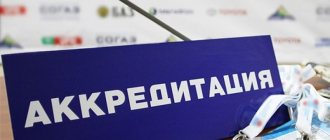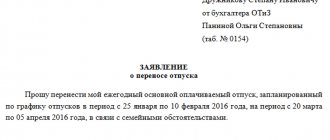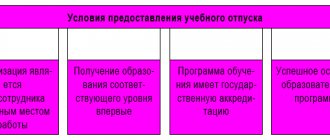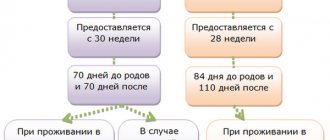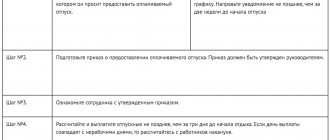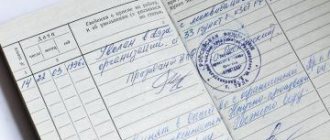General rules for study leave
Before we talk about the difficulties associated with granting this or that type of study leave, let’s consider the general rules.
First of all, the employer needs to remember: an employee’s right to study leave arises regardless of who finances his education. This means that not only those employees who study at the expense of the budget can take study leave. Such leave is also provided to those employees who study on a paid basis. It does not matter whether they pay for their studies themselves or whether these expenses are borne by the employer.
Draw up and print an employment contract
The right to study leave arises when receiving education at different levels - higher, secondary vocational, basic general, as well as when studying in graduate school. Each of these levels of education is devoted to a separate article in the Labor Code, which states in detail when and for what period educational leave should be granted (Articles 173 - 176 of the Labor Code of the Russian Federation).
The following rule: educational leave for each level of education is granted only if the employee receives such education for the first time. Let me explain. Let's assume that an employee is studying at a higher education institution for the first time. In this case, he may qualify for “student” leave. But upon receiving a second higher education, he will no longer have such a right. But if an employee, even having two higher educations, decides to acquire a new profession and enter a vocational school, or wants to get a candidate’s degree and enters graduate school, then he will be able to take educational leave. The issue of granting study leaves to those who study in several educational institutions at once is resolved in a similar way - leaves are granted only to one of the places of study of the employee’s choice. These are the requirements of Article 177 of the Labor Code of the Russian Federation.
Another condition under which the employer has an obligation to provide study leave is the presence of state accreditation for those educational programs under which training is carried out. And finally, all benefits related to training are provided only to those employees who work in the organization at their main place of work. There is no need to provide “student” leave to part-time workers (Article 287 of the Labor Code of the Russian Federation).
Compose HR documents using ready-made templates for free
What is it like?
Articles 287, 173-177 of the Labor Code (LC) stipulate not only the procedure for granting vacation time for passing examination tests, but also who is entitled to it and how the payment procedure is carried out.
A citizen who is simultaneously undergoing training and working in an organization, on the basis of current legislation, has the right to sign an application for study leave. When a citizen receives education of a certain category for the first time, the Labor Code provides for a number of payments.
It is recommended to remember the information that this is a different type of leave that cannot be changed or served as an alternative. By recording the fact what task in the educational process the citizen is pursuing and in what format he is studying, leave is granted.
- Paid. Available as an additional item. Average wages paid in production
- Unpaid. An employee can take study leave. The Labor Code does not establish a mandatory condition for receiving material payments.
Study leave before the start of studies
Now let's move on to analyzing specific cases. And first, let's look at the vacations granted to employees who are still preparing to enter educational institutions.
When and for how long is leave granted?
For employees who attend preparatory departments at universities, the employer must provide 15 days of leave to undergo final certification, if provided for by the “preparatory” program. Leave of a similar duration is also required for taking entrance exams to a university, if the employee is admitted to them.
If an employee decides to receive secondary vocational (special) education, then he has the right to “pre-educational” leave only if he is admitted to entrance exams. The duration of such leave is 10 calendar days. In this case, there is no separate leave at the end of the preparatory courses.
Let us add that “pre-study” leave is available to employees regardless of what form of study (full-time, evening or part-time) they enroll. Likewise, the right to leave to take “final” exams from preparatory courses does not depend on the form in which the training was conducted.
Grounds for granting leave
The above holidays are unpaid. However, they are not provided just like that, but on the basis of an official document that must be attached to the employee’s application. Such a document is a summons certificate issued by an educational organization. The form of this certificate was approved by order of the Ministry of Education and Science of Russia dated December 19, 2013 No. 1368.
Maintain timesheets and calculate salaries in the web service Try for free
Please note: the form of the call certificate is the same for all cases of granting study leave (both paid and unpaid). Therefore, it is necessary to check whether the educational organization has filled out this certificate correctly. Both the duration of the leave and the need to pay for it depend on the exact basis for granting leave, as well as on the type of educational organization that issued the certificate. In the absence of a summons certificate, the employer is not obliged to provide study leave, even if it is unpaid.
In the certificate of invitation to grant “pre-study” leave, one of the following phrases must be underlined: “admitted to entrance examinations” or “student of the preparatory department of an educational organization of higher education.” If the second phrase is highlighted, then you need to make sure that the certificate of challenge was issued by the university, since students of preparatory courses at other educational institutions are not granted “pre-study” leave.
You also need to take into account that if the final exams in preparatory courses and entrance exams to a university follow each other, then the employee can apply for two vacations. But for this it is necessary to submit two summons certificates, each of which must indicate the appropriate basis for granting “pre-study” leave.
Application for leave
In the application for educational leave, the employee indicates the purpose of the leave (in this case, passing final exams after completing preparatory courses, or passing entrance exams to an educational institution) and the duration of the leave. The wording in the application and in the summons certificate must match. It is also desirable that the application contains an indication of the summons certificate.
Note that if an employee applies for two “pre-study” leaves (for passing final exams after preparatory courses and for passing entrance exams), which follow each other, it is not necessary to write two applications. The request for both study leaves can be combined in one document, to which two summons certificates should be attached.
Order on granting leave
Based on the application and summons certificate, an order is issued to grant unpaid leave. The order is drawn up according to the unified form No. T-6 (approved by Resolution of the State Statistics Committee of Russia dated 01/05/04 No. 1) or according to the form developed by the employer. As a basis for granting leave, the order specifies two documents: the employee’s application and the summons certificate. The employee must be familiarized with this order and signed.
Please note: when granting two consecutive leaves, two separate orders must be issued, even if the employee submitted one application. After all, in essence, these are two different leaves, each of which requires proper personnel registration and a link to the corresponding summons certificate.
From what day is vacation granted?
The legislation of the Russian Federation does not establish any rules that would oblige an employee to notify the employer in advance of his intention to take study leave. This means that such rest periods are not fixed in advance in the vacation schedule. The employer must immediately grant study leave, even if the employee submitted a corresponding application on the day it began or the day before. In such cases, the employee is entitled to leave from the first day indicated in the summons certificate.
You need to act somewhat differently in the situation if an employee applied for study leave after it, according to the summons certificate, began. In this case, we must proceed from the fact that the employee has the right, but not the obligation, to use study leave. Therefore, leave is granted for the period that the employee reflected in the application. But at the same time, the last day of vacation should not be later than the end date of vacation specified in the call-up certificate.
How long can it last
The duration of study leave can vary: from several days to two and a half months. It all depends on the educational institution and the form of education. For example:
- upon delivery of state examinations in institutions of secondary professional level, a vacation of no more than one month is provided;
- for passing final exams in the ninth grade of evening schools - up to 9 days, in the 11th and 12th grades - up to 22 days;
- final year students of universities can get 50 days to pass the session, exams or study.
This information can be found in detail in the Labor Code of the Russian Federation.
During study leave, the employer cannot deprive the student of his job (dismiss) (except in cases where the organization is completely liquidated).
For the entire period of the educational process, the employee retains his workplace and working conditions.
Vacations for those studying evening or part-time
Employees who have entered universities or vocational education institutions are entitled to additional paid leave to take their exams. This benefit is available to those who study evening or part-time.
Calculate salary and vacation pay taking into account all current indicators
The duration of such leave depends on the course in which the employee is studying. In the first two courses, study leave to take the exam is 40 calendar days, in more senior courses - 50 calendar days. An exception is made for those studying in accelerated higher education programs. In this case, the right to 50 calendar days of vacation appears already from the second year (Article 173 of the Labor Code of the Russian Federation).
For those receiving secondary vocational education, a shorter duration of leave is established for passing the exam. In the first two courses it is 30 calendar days, and in subsequent courses - 40 calendar days (Article 174 of the Labor Code of the Russian Federation).
Evening and part-time students who have successfully completed their final year of study are entitled to additional paid leave to take final exams. When receiving higher education, their maximum duration is four months (Article 173 of the Labor Code of the Russian Federation), and when receiving secondary specialized education - two months (Article 174 of the Labor Code of the Russian Federation).
Note that in practice, the duration of each vacation (for passing a session or final exams) is usually determined not on the basis of the norms of the Labor Code of the Russian Federation cited above, but on the basis of the period indicated in the summons certificate. As a rule, this period corresponds to the period established in the Labor Code. However, there are exceptions when, according to the call certificate, the session lasts less than the deadline defined in Articles 173 and 174 of the Labor Code of the Russian Federation. It is good if in the application the employee asks to be granted leave for the period indicated in the summons certificate. But what if the employee insists on receiving leave of exactly the duration specified in the Labor Code?
The Code itself does not contain the answer to this question. Moreover, it does not specify at all the procedure for granting additional leaves and calculating their duration. In particular, the norms of Articles 173 and 174 of the Labor Code of the Russian Federation do not answer the question of for what period the maximum number of vacation days is determined in the cases under consideration - for a calendar year, for an academic year or for each session.
However, paragraph 14 of the Regulations on the specifics of the procedure for calculating average wages (approved by Decree of the Government of the Russian Federation dated December 24, 2007 No. 922) states that all calendar days (including non-working holidays) falling during the period of additional educational leave provided in accordance with with a call certificate. Thus, for the purposes of paying for study leave, only those days that are indicated in the call certificate are taken into account. Therefore, if an employee asks for a leave of greater duration than is specified in the summons certificate, then the employer has no right to refuse him. But he is not obliged to pay for such days, acting strictly according to the letter of the law.
The above recommendations for arranging pre-study leave also apply if the employee goes on paid study leave. Based on his application and summons certificate, the employer must issue an order (on Form No. T-6 or on an independently developed form). In this case, leave is granted for those days that are indicated in the summons certificate, even if the application was received on the first day of study leave. If the application is submitted later, then the leave is issued for the period specified by the employee, but at the same time, the day of the end of the leave is indicated exactly the day that is recorded in the summons certificate.
As for the payment of study leaves, the legislator has not established any special rules. This means that the general requirements of Article 136 of the Labor Code of the Russian Federation apply. Based on this article, vacation pay is paid no later than three days before the start of the vacation. Obviously, the employer will be able to fulfill such an obligation only if the employee submits in advance the documents necessary to apply for study leave. If the employee requested leave less than three days before it began, then the money must be transferred as soon as possible. The best solution would be to pay average earnings directly on the day the employee submits an application for study leave.
Keep personnel records and calculate salaries in the web service for free
Conditions of receipt
An employee has all the rights to apply for vacation time in accordance with the Labor Code (Labor Code of the Russian Federation) if he undergoes training in this category initially. For example, when he already has one education of the highest category, then upon receiving another one, he has no chance to qualify for such an opportunity.
However, in a situation where management independently sends an employee to training in order to gain new professional knowledge and a corresponding agreement has been concluded, receiving student leave for the established pay is a prerequisite.
It is worth focusing on one more aspect: within the framework of the law, taking leave is mandatory only in the situation if the student carries out student activities in an educational institution that has been able to obtain accreditation at the state level.
Confirmation appears in the form of a certificate, which is sent to the place of work by a university, college or technical school.
The document must contain certain information:
- accreditation registration number;
- when it was issued;
- authority confirming state accreditation.
The certificate in the form of a challenge is divided into two parts: the first contains the challenge itself, so that the student passes the required tests to complete the next course of study. The second part should specify what the student must pass: an exam, defend a diploma project, or state tests to graduate from a university.
In other situations, it is possible to rely on payments only in a situation where the condition is fixed in a concluded agreement or by decision of the organization.
It is important to take into account that the study vacation period can only be spent by those students who have not accumulated debts in the disciplines they have passed and have received admission to the tests. The document prepared by the institution must also include information about the student's academic performance.
Leave of absence for full-time students
Separate rules are established for employees who decide to combine work with full-time studies at higher educational institutions or vocational education institutions. They are also entitled to additional leave to pass the exam.
However, in such cases, leaves are granted without pay. Plus they are much shorter. Thus, study leave for full-time students who receive higher education is 15 calendar days, and full-time students who receive secondary specialized education is 10 calendar days. At the same time, the legislator clearly stipulated that this limit is determined in relation to the academic year (which, by the way, is another proof that the duration of vacations for part-time and evening students is established for each session).
But to pass final exams and write a thesis, “full-time” students can receive an exemption from work for the same period as evening or part-time students. Namely: a maximum of four months if the employee receives higher education, and two months if he receives secondary vocational education. But the employer is not obliged to pay for this leave either.
Unpaid study leaves for those studying full-time are provided in the same manner as discussed above. The employee must submit an application and a certificate of summons from the educational institution. Based on these documents, a leave order is issued in Form No. T-6 or in a form developed by the employer.
Educational or student - which is correct?
At an enterprise, such leave is most often called educational or student leave, however, in the Labor Code there is a precise wording for such an event. It is important to note that the code does not contain any of the above options.
In Chapter 26 of the Labor Code you can find the wording “additional leave for an employee,” or “combining work with training,” as well as obtaining education in certain disciplines.
When communicating verbally, any option can be used, but additional leave must be indicated in the documents. Depending on the situation, it is assigned with salary or at your own expense.
Study leaves for graduate students and doctoral students
Special rules for granting study leave are established for employees who combine work with pursuing academic degrees (Article 173.1 of the Labor Code of the Russian Federation). Thus, while studying in graduate school or doctoral studies, an employee has the right to paid leave of 30 calendar days. In particular, such leave can be taken for the period of preparation and passing candidate exams. The specified 30-day study leave is provided to graduate students and doctoral students who study part-time every calendar year on the basis of a summons certificate. In it, the lines devoted to the basis for receiving guarantees and compensation (passing certification, etc.) are not filled in.
Another study leave is granted to graduate students and doctoral students who are admitted to seek an academic degree and are busy preparing to defend the corresponding work. The duration of such leave is 3 months (for applicants for the degree of Candidate of Sciences) or 6 months (for applicants for the degree of Doctor of Science). This leave is granted regardless of the form of study (i.e., not only to “correspondence students”) on the basis of an extract from the dissertation council’s decision on accepting a dissertation for defense (clause 5 of the Rules for granting leave to persons admitted to compete for the academic degree of Candidate of Sciences or Doctor Sciences, approved by Decree of the Government of the Russian Federation dated 05.05.14 No. 409).
There is a clear procedure for the actions of an employee who plans to receive study leave to prepare for defending a dissertation. Firstly, one year before the start date of such leave, the employee must notify his employer of his intention to use the leave (clause 3 of the Rules). Secondly, an extract from the dissertation council’s decision to accept the dissertation for defense must be submitted within 10 working days from the date the council made such a decision. And thirdly, the application for leave must be attached directly to this extract. The application must indicate the duration of the vacation (clause 5 of the Rules).
However, the legislator did not establish any consequences for violating this procedure. However, judicial practice proceeds from the fact that the employer has the right to refuse to provide leave if the employee violated the procedure defined by Decree of the Government of the Russian Federation No. 409 (see decision of the Supreme Court of the Russian Federation dated December 11, 2014 No. AKPI14-1225).
Certain nuances regarding the provision and payment of vacation
- The CCA is given in calendar days without extension for holidays. Holidays are paid as regular calendar days.
- In case of incapacity for work during the period of compulsory medical insurance, it is not extended, and sick leave during this period is not paid. If the compulsory medical insurance is over, but the incapacity for work is not, those days of sick leave when the employee was supposed to work are paid.
Find out about sick pay for regular leave in this article..
- The employer cannot:
- refuse the CCA;
- transfer CCA;
- replace it with monetary compensation.
- The CCA does not cancel the right to basic leave. It is permissible to add OSO to the main leave (Article 177 of the Labor Code).
- The OSO should not coincide in time with any other vacation. If the employee is on another vacation, it will have to be interrupted (rescheduled) in order to issue an OCO.
How to correctly transfer another vacation, read the material “Application for transfer of vacation - form and sample” .
Entering information into the timesheet
By using special designations, the personnel officer notes the employee’s presence at the workplace, what kind of vacation he is on or whether he has sick leave:
- if an employee has taken paid student leave and does not take part in production activities, the designation “U” or the number 16 is used;
- in case of registration of additional days of leave in connection with educational activities, the number 18 or “UD” is entered on the report card;
- when vacation is not paid, use the abbreviation “DO” or the number 22.
A timesheet that records working hours exists at every enterprise, regardless of whether it is commercial or public.
What nuances may occur
Based on Federal Law-255, if sick leave is issued during study leave, then no payment occurs. But it is worth taking into account that if the sick leave remains open after the end of the vacation, compensation will be made for the remaining days.
Is it possible to take leave with subsequent dismissal?
- Study leave is classified as targeted and cannot be regarded as rest. Based on Article 127 of the Labor Code, the possibility of taking leave with subsequent dismissal is possible only if it means legal, scheduled rest.
- It is worth taking into account that the employee must inform about his resignation two weeks in advance; he can still take leave for the duration of the session or defense of his thesis project and at the same time write a letter of resignation.
What to do if the employer refuses? Based on current legislation, granting study leave is possible only if the following conditions are met:
- the employee receives the first education of this category;
- the requested number of vacation days must be within the limit established by the Labor Code;
- the educational institution must have state accreditation.
If one of the above conditions was not met by the employee, then the employer’s refusal to grant student leave is justified and does not violate the law.
Most employers would certainly like to recall an employee from vacation due to an urgent need or other number of reasons. However, such a release has a clear purpose and a certain time period; revocation is a legal violation.
Article 21 of the Labor Code clearly states the conditions for the account of preferential length of service. Thus, only the time period during which the employee carries out actual work activities is considered. Accordingly, for the duration of the vacation, the length of service will not be considered.
Regardless of where a citizen works: in a law firm or for an individual entrepreneur, if he is entitled to payment for study leave, then he is obliged to receive it. Accordingly, we can conclude that the individual entrepreneur must make registration and payments on the general conditions established by law.
Is registration possible if accreditation is suspended?
- Based on Order No. 1122 issued by the Ministry of Education and Science, if the accreditation of an educational institution is suspended, it is necessary to transfer the student to another university with valid accreditation.
- According to Article 26 of the Labor Code, the student is automatically assigned the opportunity to apply for study leave.
In the event that the transfer is not carried out and the student remains studying at the previous university, the amount of leave may be reduced or canceled altogether. The decision can be made by the management of the organization in which the employee works.
Reasons for taking leave for a session
First of all, the subordinate must bring his application for student leave to the personnel department, along with a letter of invitation from the educational institution. Moreover, there are no clear rules on how to draw up this statement. The main thing is to simply clearly indicate why the vacation is needed. For example, to prepare for a session, travel for consultations with teachers, as well as directly passing exams.
The right-call is issued and issued by the educational institution. Its first component is before the student’s tests, the second - after their completion. The employee submits them to the accounting department of the company where the applicant works.
Thus, the employee submits the first part of the certificate along with the application, and sends the second part after the end of the session. And if the second component is missing, this is not a reason to refuse vacation.
First, second and...
No matter how well the Labor Code treats student workers in the form of guarantees and compensation, it clearly divides them into two groups: those who have the right to use them and those who do not have this right.
Quite often it turns out that we have chosen the wrong college or technical school, institute or university, the wrong specialty, and we may not have enough knowledge...
And then the employee has a desire to receive another education without interruption from work: a second - secondary or higher education, or to undergo retraining in his specialty. Based on the equality of all workers, the Labor Code of the Russian Federation provides preferences to those who are receiving a certain level of education for the first time.
To obtain a second diploma, capable specialists will have to study at their own expense. “Illustrations” of this axiom are, for example, the letter of the Ministry of Labor of the Russian Federation dated November 8, 2013 No. 14-1-187 or the Determination of the St. Petersburg City Court dated May 12, 2014 No. 33-7729, which supported the employer’s legal right to refuse to provide an employee with additional paid leave, since there was no agreement between the parties on sending the employee to receive a second higher education or providing him with benefits in connection with training.
Restless applicants would do well to read some articles of the Federal Law of December 29, 2012 No. 273-FZ “On Education in the Russian Federation.” Paragraph 15 of Article 108 of this document says the following: “Persons who have a higher professional education, confirmed by the assignment of the qualification “certified specialist,” have the right to be accepted on a competitive basis for training in master’s programs, which is not considered as receiving by these persons a second or subsequent higher education".
Employees receiving education simultaneously in two educational institutions will have to choose which certificate of call to receive paid study leave (Article 177 of the Labor Code of the Russian Federation).
Interestingly, there is no direct ban on educational guarantees when obtaining secondary vocational education (of course, for the first time) by student employees who already have a higher education.

